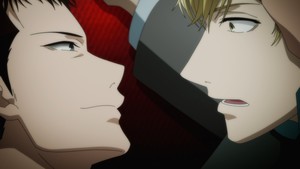
[ad_1]

Who is Hiyakawa? By this point, it’s clear that there’s something really off about him, and while we could have maybe chalked that up to his profession or his attraction to Mikado before, this week it becomes much more clear that while those may still be factors, they aren’t at the root of who he is or why he behaves the way he does. It would also be too easy to write it off as something pathological – while he does display behaviors that might align with different disorders, none of them quite fit the bill; it’s as if Hiyakawa is learning how to be a human as he goes along, and he’s not entirely sure why that is.
That’s not to suggest that he’s something other than human. This may be a supernatural show, but it’s more in the vein of serious supernatural issues rather than the lighter paranormal romance genre. They’re kissing cousins, really, as far as genres go, but paranormal romance tends to lean more into its sexier moments, and while there’s plenty of touching and terrible double entendres in this show, none of it is portrayed as overtly romantic – or at least, not until the final moments of this episode, where we could put that slant on things with Mikado blurring the line between desperately demanding and tortured yearning as he asks to see inside Hiyakawa. Still, that’s more like planting the seeds for later harvesting; the greater themes of the episodes thus far all lean much more towards what the person with just a little more control over their power can make the weaker party do.
In no way is that meant to simply reflect the Hiyakawa/Mikado dynamic. Last week we saw the mysterious creepy man in Hiura’s home and could tell that there was something unsavory going on with him, and now we find out that she’s somehow under his power, forced to use her skills at his behest. He’s trying to create “safe boxes,” spaces that collect the detritus of the human experience, and I think we have to assume that he means that in a spiritual sense rather than being really keen on old sneakers and fast-food wrappers. Essentially, he seems to be using Hiura to curse a space where he can store up dark, curse(d) power for later use. Why he wants to do this isn’t yet clear, nor is it evident what hold he has on Hiura or her parents that allows him to force her to do this for him. But his lack of regard for the well-being of others and his generally selfish demeanor seems like the scarier version of the way Hiyakawa reacts to Mikado, and that bears keeping an eye on.
Most importantly, Mysterious Creepy Man shares Hiyakawa’s apparent lack of understanding of or care for social norms. Most of us understand that you don’t do things like create cursed spaces to store up evil energy, because that’s, to put it baldly, bad. But even if Mysterious Creepy Man knows, he doesn’t seem to care at all, and that mirrors how Hiyakawa treats Mikado. Presumably, or perhaps it would be better to say “hopefully,” Hiyakawa’s learned at some point that you don’t do things to other peoples’ bodies without their consent. If he did learn that, then he’s ignoring it in order to use Mikado for his own purposes, and to aid in his work. That’s wrong, even if there is romantic or sexual attraction involved. But Hiyakawa did tell Mikado that he has no friends or parents, so perhaps he hasn’t ever actually learned anything about social norms. He probably wasn’t raised by wolves in the forest, but there are other situations that are the modern equivalent, and if Hiyakawa is one of those enfants sauvages, then he really may be picking things up as he goes along, with only Hanzawa as his mentor – and Hanzawa doesn’t seem too keen on spending time with people. (His character design also translated remarkably poorly into anime.)
Whatever the reason, we’re likely to learn it relatively soon. Mikado wants to figure out what’s going on (and possibly to stop it), but Hiyakawa’s statement that Hanzawa specifically shouldn’t omit research labs and religious organizations from his search for odd spaces may come from a memory he doesn’t want to admit – and couldn’t those both be examples of a place where a child might be raised outside of mainstream social norms?
Rating:
The Night Beyond the Tricornered Window is currently streaming on
Crunchyroll.
[ad_2]





